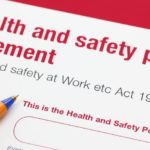Guide to safe outdoor working in extreme temperatures
Outdoor working can present certain safety risks
When it comes to outdoor working, the vast majority of people who tend to work outdoors are employed within the construction and agricultural industries.
These workers work through all seasons and all kinds of weather, often working long hours.
As such, there are some risks involved, so it’s important that as an employer you do your upmost to ensure any workers participating in outdoor working activities are kept safe from harm.
Equally, if you are an employee, then you need to make sure that you keep yourself and your colleagues safe and adhere to best working practices.
It is estimated that around several million people work outside every year in various industries.
The Health and Safety Act 1974 outlines the requirements for the provision of health, safety and welfare at work.
Employers can also gain free advice and guidance from the HSE, who will advise them on how best to ensure worker safety outdoors.
UK temperature regulations for outdoor working
You may be surprised to learn that there are actually no legal minimum temperature regulations in place for people working outdoors in the UK.
This is in contrast to laws being in place for indoor workers that stipulate that the minimum temperature should be 16°C, or 13°C for any ‘strenuous work’
However, despite there being no legal minimum temperature for outdoor working, there are still health and safety regulations in place that employers must adhere to in order to protect outdoor workers from extreme UK temperatures.
Employers have a duty of care to their employees under these Health and Safety regulations, meaning they have overall responsibility for ensuring their workers are not working in what could be considered ‘unsafe’ or ‘unhealthy’ conditions or environments.
Any employees that are allowed to participate in outdoor working in extreme weather conditions, whether too hot or cold, could well mean their employers are in breach of this ‘duty of care’.
There are things your employer should do to comply with health and safety regulations, such as carrying out of risk assessments for outdoor working in extreme weather conditions in order to ensure workers are kept safe from the elements.
Any risk assessments carried out should take into account both the outside air temperature and the wind chill factor as both are equally important in the UK climate.
Additionally, anyone who is outdoor working should be provided with appropriate personal protective equipment (PPE) by their employer such as gloves, hats, thermal underwear, correct footwear and clothing, and they should also be provided with warm and dry mobile facilities (eg office space, toilets).
Workers should be given more rest breaks than usual, and hot drinks should be made readily available for anyone involved in outdoor working.

Tips to ensure your safety when working outdoors
In summary, here is a checklist of what you can do with immediate effect to safeguard your workforce whose job involves outdoor working:-
1. Risk assessment
The first thing you should do is carry out a risk assessment to see which hazards exist, who they affect and how to put the correct safety measure in place.
2. Training
Once you’ve identified any risk, your workers will need to receive the correct training in order to ensure their own safety when working outdoors, as well as the safety of others.
Part of the training should include warning about the dangers of sun exposure, using sun protection and regularly checking for skin damage.
Likewise, workers should know how to protect themselves when working outdoors in cold weather, wearing the correct clothing etc.
3. Clothing
It is important that outdoor workers wear the correct protective clothing to suit the job they are doing.
Hats should be worn where relevant to protect the head, gloves to protect the hands and the correct PPE clothing and footwear depending on the job they are doing and existing weather conditions.
4. Shade
When the sun is out and the weather is warm, it’s vital that employees involved in any outdoor working roles are encouraged to take regular breaks in the shade.
As such, employers must ensure that a shaded area is provided at all times.
This will help workers to feel more comfortable and will maximise their productivity.
5. Hydration
Drinking water regularly can help keep workers alert, hydrated and prevent heat stress in hot weather.
Employers should provide cool drinking water in the workplace, combating heat stress and overheating.
6. Keeping food cool
To prevent food contamination and illness in warm conditions, workers should be provided with a fridge to keep perishable foods in.
7. Heat stress
Workers need to be made aware of the effects of heat stress. It is strongly advised that outside workers are given regular breaks in the shade and encouraged to drink plenty of cool/chilled water in order to stay hydrated and focused.
Doing all this will reduce incidents of heat stress.
8. Cold stress
Workers need to be aware of cold stress and make sure they wear insulated clothing and thermals, hats and gloves where necessary to protect them from the extremes of cold weather. Outdoor work in cold weather conditions should be limited where possible and warm mobile facilities provided where workers can shelter from the cold and where they can have access to hot drinks on a regular basis.
9. Allergies
Workers should be provided with protective equipment eg masks or glasses so they are protected at all times and any allergies they may have can not be made worse by the environment they are in.
10. Work schedule
In warm weather conditions, employers should schedule work so that workers don’t spend too much time in the sun and work at cooler times in the day.
Likewise, in cold weather, employers should minimise their employees working outdoors in the cold as much as possible, and even consider delaying outdoor working until the weather conditions are warmer ie in the spring/summer months.
Online workplace safety courses
Here at UK Online Training, we provide a variety of short online training courses in workplace safety, including courses for workers whose job involves a lot of outdoor working.
Whether you are an employer or an employee and work in an office, industrial, commercial, public service or healthcare setting, you will benefit from studying one or more of our workplace safety courses.
Our online courses include popular topics such as manual handling, risk assessments, slips, trips and falls and COSHH.
Need help in finding the right online training course for you or your staff? Then complete the contact form on this page or give us a call on 0161 763 3727 and we’ll be happy to assist.
Other articles you may find interesting…
- Health & safety legislation UK FREE On-line course Certificate & Support
 Are you a business owner needing to know more about health and safety legislation in the UK? This article sets out your legal responsibilities under UK law.
Are you a business owner needing to know more about health and safety legislation in the UK? This article sets out your legal responsibilities under UK law. - Fire safety in the workplace
 Business owners, Landlords, commercial property owners & managers must follow strict regulations for fire safety in the workplace in the UK. Read our article to find out what your responsibilities are.
Business owners, Landlords, commercial property owners & managers must follow strict regulations for fire safety in the workplace in the UK. Read our article to find out what your responsibilities are. - Display Screen Equipment Awareness online training
 Are you a business owner needing to know more about health and safety legislation in the UK? This article sets out your legal responsibilities under UK law.
Are you a business owner needing to know more about health and safety legislation in the UK? This article sets out your legal responsibilities under UK law. - First Aid Regulations UK
 Are you a UK employer and wondering what you must do to comply with the first aid regulations? This article will explain what you need to know and do.
Are you a UK employer and wondering what you must do to comply with the first aid regulations? This article will explain what you need to know and do.




